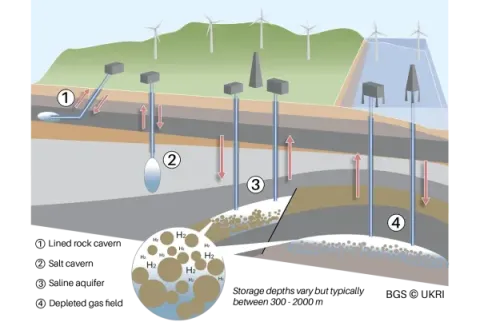Making the case for underground hydrogen storage in the UK
A new BGS science briefing note focuses on the potential of hydrogen storage to support the UK energy transition.
BGS briefing notes aim to communicate the latest scientific research in a succinct format to policymakers, industry and the general public. The latest note, ‘Underground hydrogen storage: insights and actions to support the energy transition’, outlines the current state of play in terms of hydrogen storage research and development, and names underground hydrogen storage as an emerging technology that will be crucial to support the UK’s transition to net zero.
As renewable energy sources like wind and solar increase their market share, the need for reliable, long-duration energy storage solutions become increasingly important for enabling a balance between supply and demand. Hydrogen, produced from renewable sources, can act as an effective energy carrier to store excess power as well as an alternative fuel to decarbonise hard-to-abate sectors like shipping and heavy industry.
Various underground storage technologies, such as salt caverns, lined rock caverns and depleted hydrocarbon fields, provide scalable and long-duration hydrogen storage options. Although they require significant initial investment and specific geological conditions, these technologies offer the potential for large-scale, long-duration storage capacities.
Currently, the UK energy storage system holds some of the lowest levels of gas storage in Europe, at 12 days average. Estimates for the hydrogen storage required by net zero in 2050 are up to five times greater than the current UK gas storage capacity, but there are still considerable knowledge gaps in how and where such large-scale storage can be achieved.
The briefing note provides key recommendations in order to close these knowledge gaps:
implement more demonstration projects to build in situ technical capability, address market barriers and promote wider hydrogen adoption
integrate hydrogen storage into the UK’s energy strategy through comprehensive planning and supportive regulatory frameworks
invest in research and development to rapidly expand knowledge in the hydrogen storage technologies essential for meeting clean energy targets







